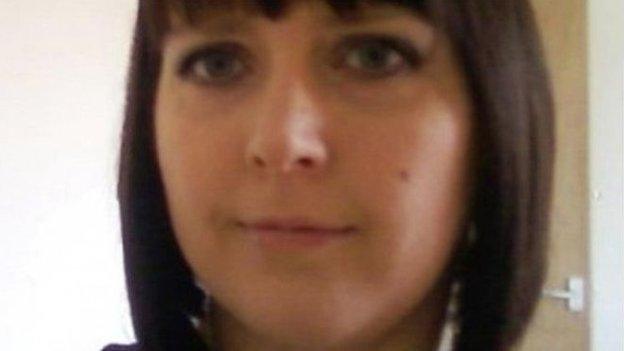'Clare's Law' domestic abuse scheme rolled out in Scotland
- Published

Clare Wood did not know her ex-boyfriend had a long history of violence against women
A scheme which allows people to be told if their partner has been violent in the past has been introduced in Scotland.
It follows a six-month trial in Aberdeen and Ayrshire which saw 22 people warned that their partners had a history of domestic abuse.
Clare's Law was introduced across England and Wales in March 2014.
The initiative is named after Clare Wood, who was murdered by her violent ex-boyfriend several years ago.
The 36-year-old was strangled and set on fire by George Appleton in Salford, Greater Manchester, in 2009. She was unaware of his history of violence against women.
Her father, Michael Brown, has campaigned for people to have the right to ask for information about partners, and for the police and other agencies to have the power to take the initiative and tell someone if there are grounds for concern.
Clare's Law: The Facts
Otherwise known as the Domestic Violence Disclosure Scheme, or Disclosure Scheme for Domestic Abuse Scotland (DSDAD) in Scotland
Rolled out in England and Wales last year
Since then, 3,760 applications and have been made in England and Wales
The Scottish trial in Aberdeen and Ayrshire saw 59 cases being considered, with 22 people so far being informed about their partner's violent past
30 of those cases were in Aberdeen, with eight disclosures being made
Police Scotland said the aim of the scheme was to prevent domestic abuse by "empowering" men and women with the "right to ask".
In the past, it was difficult for anyone entering a new relationship to find out if their partner had prior convictions for violence or domestic abuse.
Disclosures can also be triggered by friends, relatives, social workers or police officers.
If checks show that someone does have a record of abusive behaviour, the police will consider sharing the information with the people "best placed" to protect potential victims. Requests are made on the Police Scotland website.
The force's figures show that the number of domestic abuse incidents reported in Scotland from 1 April 2014 - 31 March 2015 increased by 1,076 to 59,471 compared to the same period the year before.
'Heinous crime'
The authorities hope that the disclosure scheme could play a part in protecting hundreds of potential victims.
Justice Secretary Michael Matheson said: "Domestic abuse is an appalling crime and I am delighted that, as a result of the national rollout of the scheme, people across Scotland who suspect their partner may have a violent past will have the right to ask for information.
"The results of the pilot clearly show that the scheme works well and is a good fit for Scotland's unique justice system. Put simply - it can save lives and sends a clear message that abusers can no longer hide.
"The Scottish government recently announced £20m funding to tackle all forms of violence against women and girls, including domestic abuse, across the country and we are committed to tackling this heinous crime head on. There is absolutely no place for it in Scotland."
- Published1 July 2015